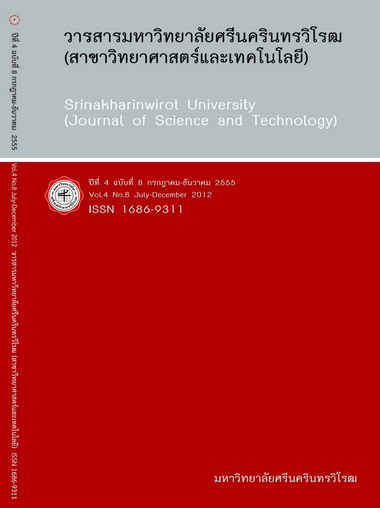การประเมินผลกระทบของนโยบายภาษีรถยนต์ประหยัดพลังงานขนาดเล็ก กรณีศึกษา ภาคตะวันออกเฉียงเหนือ (IMPACT ASSESSMENT OF ECONOMIC CAR’S AUTO-RELATED TAX CASE STUDY: THE NORTHEAST REGION OF THAILAND)
Keywords:
Economic Car, Analysis Hierarchy Process, Logit ModelAbstract
บทคัดย่อ
การศึกษานี้เป็นการศึกษาถึงปัจจัยที่มีอิทธิพลต่อการตัดสินใจเลือกซื้อรถยนต์นั่งส่วนบุคคล โดยสุ่มตัวอย่างแยกตามกลุ่มผู้สนใจจะซื้อรถยนต์นั่งส่วนบุคคลที่มีขนาดเครื่องยนต์แตกต่างกัน จาก 7 จังหวัด ของภาคตะวันออกเฉียงเหนือ โดยใช้วิธีการวิเคราะห์การตัดสินใจแบบลำดับชั้น ในการวิเคราะห์ค่าน้ำหนักปัจจัยต่างๆ ที่มีอิทธิพลต่อการตัดสินใจเลือกซื้อรถยนต์ของผู้สนใจที่จะซื้อรถยนต์แต่ละประเภท โดยผลการศึกษาชี้ให้เห็นว่า กลุ่มผู้สนใจจะซื้อรถยนต์นั่งขนาดไม่เกิน 7 ที่นั่ง ที่มีขนาดเครื่องยนต์ต่ำกว่า 1,500 ลูกบาศก์เซนติเมตร จะให้ความสำคัญกับ ความเหมาะสมของราคา อัตราการสิ้นเปลืองน้ำมัน ราคาอะไหล่ ความสวยงาม และอุปกรณ์อำนวยความสะดวก ตามลำดับ และได้ทำการสร้างแบบจำลองโลจิต ในการพยากรณ์ผลกระทบจากการเปลี่ยนแปลงโครงสร้างภาษีรถยนต์ โดยพิจารณาปัจจัย 4 ด้าน ได้แก่ ราคารถยนต์ การเสียภาษีประจำปี ราคาน้ำมันเชื้อเพลิง และสมรรถนะของรถยนต์ โดยประเภทรถที่พิจารณาได้แก่ รถยนต์ใหม่ รถยนต์มือสอง และรถยนต์ประหยัดพลังงานขนาดเล็ก จากผลการศึกษาพบว่า ปัจจัยด้านราคามีผลต่อการตัดสินใจเลือกซื้อรถยนต์มากที่สุด รถยนต์ใหม่จะมีความอ่อนไหวต่อตัวแปรทุกตัวใกล้เคียงกันในระดับต่ำ ส่วนรถยนต์มือสองจะมีความอ่อนไหวต่อตัวแปรค่อนข้างสูง โดยเฉพาะอย่างยิ่งตัวแปรด้านราคารถยนต์จะมีความอ่อนไหว มากเป็นพิเศษ สำหรับรถยนต์ประหยัดพลังงานขนาดเล็ก มีความอ่อนไหวต่อตัวแปรที่เกี่ยวกับราคาและภาษีรถยนต์ ค่อนข้างสูงจากแบบจำลองโลจิต พบว่า หากมีการเพิ่มอัตราภาษีต่อทะเบียนประจำปีของรถยนต์ปกติอีกเท่าตัว และลดอัตราภาษีต่อทะเบียนประจำปีของรถยนต์ที่เป็นมิตรต่อสิ่งแวดล้อมลงโดยจัดเก็บในอัตราร้อยละ 50 ของรถยนต์ปกติ จะทำให้ประชาชนหันมาตัดสินใจเลือกใช้รถยนต์ประหยัดพลังงานขนาดเล็ก (Eco car) เพิ่มขึ้นร้อยละ 5.26 เมื่อเทียบกับการดำเนินนโยบายภาษีที่มีอยู่ในปัจจุบัน
Abstract
This research examined the factors and their hierarchy influencing the purchasing of passenger car by people who interested in varies size of car’s engine. The data are collected in 7 provinces of the north-east of Thailand. The result is found that, the group of people who interested to buy passenger car (7 seating) which engine size less than 1500 cc, significant factors are price, fuel consumption, maintenance cost, image, and facilities. The logit model has been created to predict the impact of car tax structure changed from 4 considering factors such as price, registration fee per year, fuel price, and capability. This study, passenger car to be made a decision can be classified into 3 types: new car, old car or secondhand car and economic car. The result is shown that car’s pricing is the most important factor for all type of car purchasing. For sensitivities analysis is found that new cars provide a level of sensitivity in all variables equally low. The secondhand car are highly sensitive to all variables, in particularly the car pricing is especially sensitive. The economic car, it is sensitive to car price and taxes in high level. The result of logit model is shown that the people will change their decision to select the economic car increased from the present equal 5.26% when increased of the annual registration tax of normal car to twice and decreased the annual registration tax of environmental friendly car by 50% of normal rate.
Downloads
Downloads
Published
How to Cite
Issue
Section
License
Srinakharinwirot University Journal of Sciences and Technology is licensed Under a Creative Commons Attribution-NonCommercial-NoDerivs 4.0 International (CC-BY-NC-ND 4.0) License, Unless Otherwise Stated. Please Read Journal Policies Page for More Information on Open Access, Copyright and Permissions.



